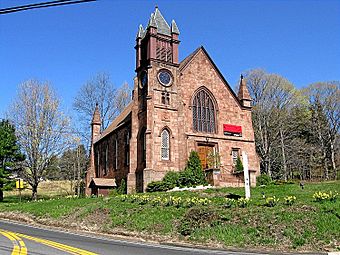Northford Center Historic District facts for kids
Quick facts for kids |
|
|
Northford Center
|
|

Northford Congregational Church
|
|
| Location | Roughly along Middletown Ave. and parts of Old Post Rd., North Branford, Connecticut |
|---|---|
| Area | 230 acres (93 ha) |
| Architect | Henry Austin; Boylan, Alfred W. |
| Architectural style | Colonial, Early Republic |
| NRHP reference No. | 02001629 |
| Added to NRHP | December 31, 2002 |
The Northford Center Historic District is a special area in Northford, Connecticut, which is part of North Branford, Connecticut. It's like a living museum that shows how a village grew and changed over time. This historic district stretches along Middletown Avenue and includes parts of Old Post Road. It's filled with old buildings that tell stories of the past. Many of these buildings were built before the American Civil War. The district was added to the National Register of Historic Places in 2002.
Exploring Northford's Historic Heart
This historic district covers about 230 acres (93 hectares). It includes many interesting buildings. You can see two churches, like the beautiful Northford Congregational Church. This church was designed by a famous architect named Henry Austin. There's also an old schoolhouse called the Fourth District School. Many of the houses in the district are very old, including the Howd-Linsley House.
A Glimpse into Northford's Beginnings
Northford started as a small settlement in the early 1700s. It was first part of the New Haven Colony. Later, it became part of Branford, Connecticut. In 1831, Northford became its own town, North Branford, Connecticut.
The village center grew around a colonial meeting house. This meeting house was built around 1745. At first, Northford was mostly a farming community. It also served travelers using the old post road. One of the oldest buildings still standing is a tavern built in 1776.
From Farms to Factories
In the 1800s, Northford changed a lot. It became a small industrial center. The main industry was making things like pins, screws, and other metal parts. Two important families, the Maltby and Fowler families, ran these businesses.
Because of this growth, the buildings in the district are very different. You can see styles from the 1700s to the early 1900s. Most of the buildings were built before the American Civil War. However, some newer homes were built by the wealthy industrial leaders.
 | Claudette Colvin |
 | Myrlie Evers-Williams |
 | Alberta Odell Jones |



